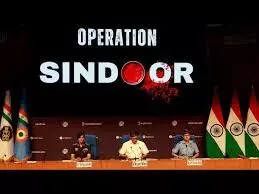Operation Sindoor: India Won Objectives, Lost the Narrative

Today at 1200 hrs, Directors General of Military Operations (DGMOs) from both sides were scheduled to hold talks. However, according to government sources, Operation Sindoor remains ongoing as the terrorists who attacked tourists in Pahalgam have not yet been apprehended.
While the Government of India and the Armed Forces have asserted that India achieved its objectives – specifically, debunking Pakistan’s nuclear rhetoric and demonstrating the capability to strike deep anywhere in Pakistan – the question remains: Can Operation Sindoor be deemed an complete success word ?
Operationally and tactically, the answer appears to be a resounding yes. However, concerning the narrative, particularly in cyberspace and on social media, the outcome is a significant no. Despite winning the military engagement, India struggled to control the information space, while Pakistan, having lost the war on the ground, arguably won the narrative online.
The Pakistani establishment and their social media platforms actively disseminated a large volume of fake narratives and news. This campaign was so effective that, despite the clear success of our strikes, many Indians felt a sense of disappointment and dejection. This was a direct consequence of the false narratives and fake news propagated by the Pakistani establishment and their handlers.
Many Indians active on platforms like Twitter found their feeds dominated by tweets and posts from Pakistan claiming India was losing the conflict. These posts falsely alleged that Indian bases and jets were hit, fighter pilots captured, and key Indian installations struck by Pakistan. Any rational observer would recognise this as psychological warfare, aimed at undermining the morale of Indian citizens. Until the DGMOs' conference yesterday evening, there was a pervasive feeling, fueled by these narratives, that India had been forced into a ceasefire by Western pressure and had emerged as the loser.
This conflict offers a crucial lesson: military superiority, advanced intelligence gathering technology, and might across all three fronts are essential, but they must be complemented by a superior edge in the digital space, on social media platforms, and influence over foreign media. It is imperative to be proactive in disseminating narratives that serve one's agenda. The side that wins the narrative is often the one that establishes it first.
Throughout the period of military success, India was constantly playing catch-up with Pakistani handlers who relentlessly spread falsehoods, leading them to celebrate a perceived victory in their loss. This is a critical lesson for India. In future conflicts, it is essential to have a robust presence in cyberspace to counter enemy narratives effectively.
Ultimately, this engagement underscores that technology can be a powerful deterrent and can influence outcomes without physical borders being crossed. However, it also highlights the necessity for military might and success to be visible to the world with speed and clarity to shape the global narrative.
Ranjit G Nair, Naval Veteran and Defence Expert
